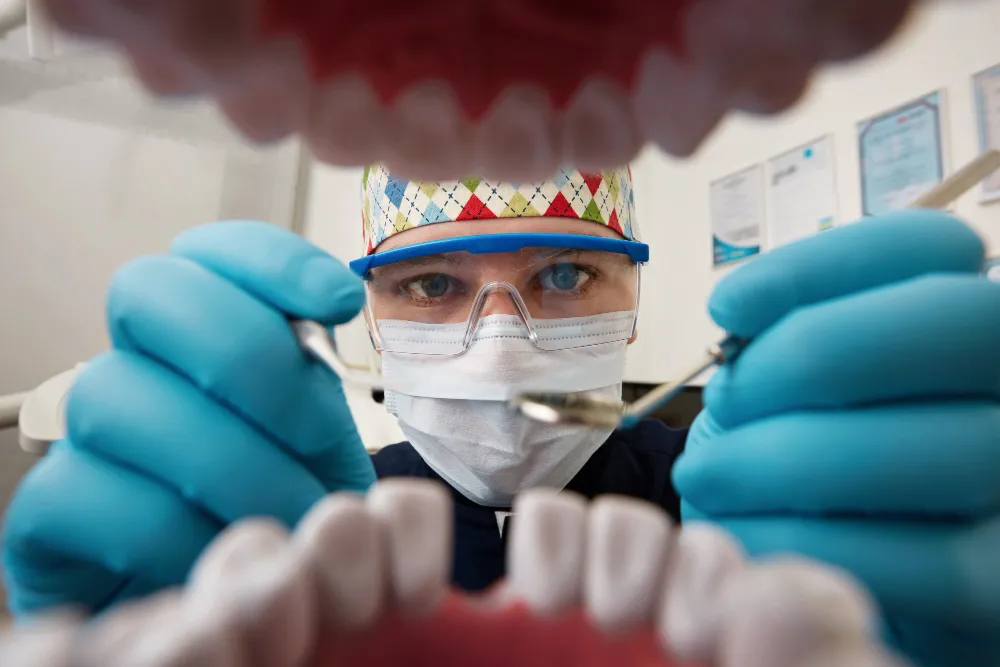Dental Crowns: When Do You Need One and What Are the Options?
Dental crowns are a common and highly effective solution for restoring the health, function, and appearance of damaged or weakened teeth. Whether you have a cracked tooth, a large cavity, or have recently undergone a root canal, a dental crown can help protect your tooth and prevent further damage. But how do you know when you need a dental crown, and what are your options when it comes to choosing one?
At Katy Lakes Dentistry, we offer various types of dental crowns to meet the unique needs of our patients. In this comprehensive guide, we’ll explain when you might need a crown, the benefits they offer, and the different types available so you can make an informed decision about your dental health.]

What Is a Dental Crown?
A dental crown is a tooth-shaped cap that is placed over a damaged or weakened tooth to restore its shape, size, strength, and appearance. Crowns are custom-made to match the natural color and contours of your teeth, ensuring a seamless, natural-looking smile.
The crown completely encases the visible portion of the tooth above the gum line, providing protection and support for teeth that are cracked, decayed, or weakened by previous dental work. Crowns can be made from a variety of materials, including porcelain, metal, and ceramic.
When Do You Need a Dental Crown?
There are several situations in which a dental crown may be recommended by your dentist. Here are some of the most common reasons you might need a crown:
1. Tooth Decay
If you have a large cavity that can’t be treated with a filling alone, a crown may be necessary to protect the tooth from further decay or infection. When a tooth is significantly weakened by decay, a crown helps restore its strength and function.
2. Cracked or Broken Tooth
A cracked or broken tooth can cause pain and increase the risk of further damage. A crown can be used to cover the damaged tooth, preventing the crack from spreading and protecting the tooth from infection or breakage.
3. After a Root Canal
After undergoing a root canal, the tooth can become fragile and more prone to breaking. A dental crown is often placed on top of the treated tooth to provide added strength and protection, ensuring that it remains functional for years to come.
4. Worn-Down Teeth
Teeth that have been worn down due to bruxism (teeth grinding) or acid erosion may require crowns to restore their shape, size, and function. Crowns can prevent further wear and help restore your bite.
5. Cosmetic Improvement
If you have a misshapen or discolored tooth, a dental crown can improve its appearance. Crowns are often used in cosmetic dentistry to enhance the look of a smile by covering unsightly teeth and creating a more uniform appearance.
6. Supporting a Dental Bridge
Dental crowns are used to support a dental bridge, which is a restoration that replaces one or more missing teeth. The crowns are placed on the teeth adjacent to the gap, anchoring the bridge in place and restoring your smile.

What Are the Different Types of Dental Crowns?
At Katy Lakes Dentistry, we offer several types of dental crowns, each with its own benefits. The best option for you will depend on your specific dental needs, your budget, and your aesthetic preferences. Here’s an overview of the most common types of crowns:
1. Porcelain-Fused-to-Metal (PFM) Crowns
Porcelain-fused-to-metal crowns are a popular choice because they combine the strength of metal with the natural appearance of porcelain. The metal base provides durability, while the porcelain coating matches the color of your natural teeth, making it a great option for both front and back teeth.
Pros:
- Strong and durable
- Natural appearance
- More affordable than all-ceramic crowns
Cons:
- May develop a dark line along the gum line over time
- Can wear down opposing teeth if the porcelain is rough
2. All-Ceramic or All-Porcelain Crowns
All-ceramic or all-porcelain crowns offer the most natural appearance and are an excellent choice for front teeth. These crowns are made entirely of porcelain or ceramic materials, making them highly aesthetic.
Pros:
- Best match for natural tooth color
- Ideal for people with metal allergies
- Highly aesthetic, making them ideal for front teeth
Cons:
- Not as strong as metal or PFM crowns
- More prone to chipping, especially for patients with bruxism
3. Metal Crowns
Metal crowns are made from gold, platinum, or other metal alloys. While they don’t offer the same aesthetic appeal as porcelain or ceramic crowns, they are incredibly durable and long-lasting, making them an excellent choice for molars and other teeth that endure heavy chewing forces.
Pros:
- Extremely durable and resistant to wear
- Long-lasting (can last many years without breaking)
- Less tooth structure needs to be removed
Cons:
- Not aesthetic (visible metal)
- Typically not used for front teeth
4. Zirconia Crowns
Zirconia crowns are made from a strong ceramic material called zirconium dioxide. These crowns offer the durability of metal crowns with the aesthetic appeal of porcelain crowns. They are often used for both front and back teeth.
Pros:
- Highly durable and resistant to wear
- Natural tooth-like appearance
- Less likely to chip than all-porcelain crowns
Cons:
- Can be more expensive than other crown types
- May require more tooth reduction than metal crowns
5. E-Max Crowns
E-Max crowns are made from lithium disilicate, a type of glass ceramic known for its strength and aesthetic appeal. These crowns are highly translucent, making them an ideal option for patients looking for a natural-looking restoration.
Pros:
- Highly aesthetic and natural-looking
- Durable and long-lasting
- Ideal for front and back teeth
Cons:
- Can be more expensive than other crown materials
What to Expect When Getting a Dental Crown
Getting a dental crown typically requires two visits to your dentist. Here’s what you can expect during the process:
First Visit: Preparing the Tooth
- Your dentist will examine and prepare the tooth by removing any decay and shaping the tooth to fit the crown.
- An impression of the tooth is taken to create a custom-made crown.
- A temporary crown will be placed on the tooth to protect it while your permanent crown is being made.
Second Visit: Placing the Crown
- Once your permanent crown is ready, you’ll return to the office to have it placed.
- Your dentist will remove the temporary crown, clean the tooth, and cement the permanent crown in place.
- The crown will be adjusted to ensure a proper fit and comfortable bite.
How Long Do Dental Crowns Last?
Dental crowns are a long-lasting solution for restoring damaged teeth, but their lifespan can vary depending on the type of crown, your oral hygiene habits, and the amount of wear and tear they endure. On average, dental crowns last between 10 to 15 years, but with proper care, they can last even longer.
To maximize the lifespan of your crown, it’s important to:
- Practice good oral hygiene by brushing and flossing daily.
- Avoid chewing on hard objects, such as ice or pens.
- Wear a mouthguard if you grind your teeth at night.
- Visit your dentist regularly for checkups and cleanings.
Frequently Asked Questions About Dental Crowns
1. How much do dental crowns cost?
The cost of a dental crown depends on the material used and the complexity of the procedure. Metal crowns tend to be more affordable, while all-ceramic or zirconia crowns may be more expensive. Dental insurance often covers a portion of the cost, especially if the crown is needed for functional reasons.
2. Does getting a crown hurt?
The process of getting a crown is typically painless, as your dentist will numb the area before beginning the procedure. Some patients may experience mild discomfort or sensitivity after the crown is placed, but this should subside within a few days.
3. Can I whiten my dental crown?
Unfortunately, dental crowns cannot be whitened. If you’re considering teeth whitening, it’s best to whiten your natural teeth before getting a crown to ensure a close color match.
Restore Your Smile with Dental Crowns at Katy Lakes Dentistry
If you’re dealing with a damaged or weakened tooth, a dental crown may be the solution you need to restore your smile. At Katy Lakes Dentistry, we offer a range of dental crown options to meet your needs, from porcelain-fused-to-metal to zirconia and all-ceramic crowns. Our team will work with you to find the best option for your smile, ensuring a natural-looking, long-lasting result.
Ready to protect your smile? Contact us today at (832) 913-1772 to schedule a consultation and learn more about how dental crowns can improve your oral health and confidence.
